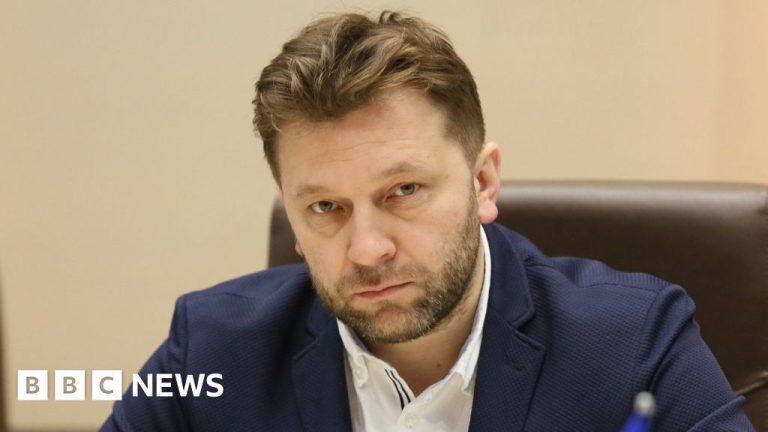Luc Vocks
Dutch entrepreneur Luc Vocks runs his business from Moldova
The Eastern European country of Moldova continues its efforts to attract foreign businesses, while trying to overcome political uncertainty.
“I went there with a backpack and started a business,” says Dutch entrepreneur Luc Vocks, recalling how he moved to Moldova in 2007.
Mr. Vocks had visited the former Soviet republic for the first time three years earlier and remembers experiencing “the cliché one would have of Eastern Europe at that time.”
“Everything was very cheap, and if you were a foreigner you would attract attention,” he says.
Today, Mr. Vocks owns a Moldovan company called DevelopmentAid. Based in the capital Chisinau, it employs 180 people in the country and runs a website listing job vacancies in the international development community.
Mr. Vocks is one of the growing number of foreign entrepreneurs in Moldova. The government wants to attract more people like itself and hopes low business tax rates will help.
The country's standard corporate tax rate – the amount companies must pay on their profits – is just 12%. This compares to 25% in the UK and 25.8% in the Netherlands, where Mr Vocks initially launched his business before moving it to Moldova.
There's an even better deal for tech companies. In 2018, the Moldovan government launched an initiative to develop the country's IT sector: the Moldova IT Park (MITP).
This is not a physical activity park. Rather, it is a virtual program open to all IT companies in the country – and to those wishing to set up there from abroad. Companies that register only have to pay a corporate tax rate of 7%.
The MITP is part of a broader effort by the Moldovan government to modernize and develop its economy in preparation for a bid to join the European Union in 2030.
This campaign is led by pro-European Moldovan President Maia Sandu, who was re-elected this week for a second term. And last month, Moldovans voted “yes” to pro-European constitutional changes.
However, the vote was extremely close, with Yes obtaining 50.46% and No 49.54%. Although Russia denied interference in the vote, Moldovan authorities said attempts were made to buy up to 300,000 votes, which Maia Sandu described as an “unprecedented attack on freedom and democracy “.
Moscow opposes Moldova's membership in the EU and supports the breakaway region of Transnistria economically, politically and militarily.
Getty Images
Moldovan President Maia Sandu was re-elected for a second term
Dumitru Alaiba, Deputy Prime Minister and Minister of Economic Development and Digitalization of Moldova, is optimistic about the direction Moldova is taking.
“Over the last 10 to 15 years, Moldova has really proven that it is a country that can change very quickly,” he told the BBC.
“It was a very corrupt country, a country where, exactly ten years ago, a billion dollars from our central banks disappeared.”
“We are moving very quickly towards EU membership and we are reforming our economy at full speed. Of course we have a long way to go.”
He highlighted Moldova's rise in the Global Corruption Perceptions Index, produced by anti-corruption watchdog Transparency International.
Out of 180 countries – a lower ranking meaning a country is less corrupt – Moldova now occupies 76th place, up from 91st a year earlier.
“Now entrepreneurs can breathe freely without fear of reprisals, without fear of corrupt inspectors, without fear of a filthy justice sector committing senseless abuses.”
Mr Vocks agrees that Moldova is now a much easier place to do business than when he started his company there in 2007.
“At the time it was extremely bureaucratic. It was difficult to get a residence permit. It was painful to register a business, especially as a foreigner.
“It was painful to come across the taxman. It was difficult to work with the banks.”
Getty Images
The main government building in Chisinau clearly shows the administration's desire to join the EU
MITP member companies not only benefit from the 7% corporate tax rate. They also do not have to contribute to their employer's social security and employees do not have to pay income tax. Mr. Volks signed DevelopmentAid almost immediately.
MITP has also simplified immigration procedures through the IT Visa program.
More than 2,000 companies are now registered with MITP, including 300 from abroad. The most common countries of origin are the United States, United Kingdom, Germany, Netherlands and Ukraine.
In the first half of 2024, MITP companies generated a total turnover of €365 million ($397 million; £308 million), according to official figures. And now employing 22,000 people overall, they would contribute around 6% of the country's GDP.
Although the MITP program has helped boost Moldova's IT sector, the influx of foreign technology companies has significantly increased wages in the sector.
Sven Wiese, a German expat who started a small IT services company in the country called Trabia, says he now finds himself outpriced when it comes to employee compensation.
He says the biggest companies joining MITP can offer IT specialists more than 100,000 euros per year, “because it's still cheaper than hiring people in a bigger country like the US or Germany.” .
Dumitru Alaiba
Deputy Prime Minister Dumitru Alaiba says corruption in country has been tackled
At the same time, he claims that many Moldovan IT workers still want to leave the country. “Fewer and fewer people are leaving Moldova, but emigration remains high.”
Another negative issue is the continuing war in neighboring Ukraine, which is probably making some Western IT companies think twice before investing in Moldova. Mr. Alaiba says he is confident in Moldova's security “as long as the free world supports Ukraine.”
Marina Bzovii, MITP administrator and assistant professor at the Technical University of Moldova, already sees Moldova as a regional business hub. “Moldova even connects Central Asia, countries like Kyrgyzstan, Tajikistan and Uzbekistan, which are culturally much further from Europe.
“However, Moldova understands both cultures. So it's the kind of business center that Europe needs… and Chisinau is now really vibrant.”

